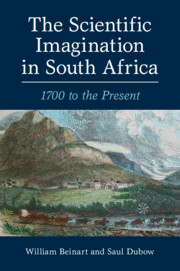Book contents
- The Scientific Imagination in South Africa
- The Scientific Imagination in South Africa
- Copyright page
- Contents
- Map
- Figures
- Acknowledgements
- Introduction: The Scientific Imagination in South Africa
- 1 Scientific Imagination and Local Knowledge at the Cape in the Eighteenth Century
- 2 Scientific Governance and Colonial Institutions, c. 1800–70
- 3 Technological Innovation and the Scientific Imagination in Mining and Agriculture, 1870–1902
- 4 Science, Reconstruction and the Imagining of the First ‘New’ South Africa, 1902–29
- 5 The Commonwealth of Knowledge, 1930–48
- 6 The Republic of Science, 1948–90
- 7 Big Science and Indigenous Knowledge: Post-Apartheid South Africa and the African Renaissance
- Afterword
- Select Bibliography
- Index
7 - Big Science and Indigenous Knowledge: Post-Apartheid South Africa and the African Renaissance
Published online by Cambridge University Press: 07 May 2021
- The Scientific Imagination in South Africa
- The Scientific Imagination in South Africa
- Copyright page
- Contents
- Map
- Figures
- Acknowledgements
- Introduction: The Scientific Imagination in South Africa
- 1 Scientific Imagination and Local Knowledge at the Cape in the Eighteenth Century
- 2 Scientific Governance and Colonial Institutions, c. 1800–70
- 3 Technological Innovation and the Scientific Imagination in Mining and Agriculture, 1870–1902
- 4 Science, Reconstruction and the Imagining of the First ‘New’ South Africa, 1902–29
- 5 The Commonwealth of Knowledge, 1930–48
- 6 The Republic of Science, 1948–90
- 7 Big Science and Indigenous Knowledge: Post-Apartheid South Africa and the African Renaissance
- Afterword
- Select Bibliography
- Index
Summary
The post-apartheid ANC government took pride in repurposing the country as a modern, democratic state and promoted a vision of science and technology for the common good. Astronomy was a particular beneficiary of the new dispensation. The Southern African Large Telescope at Sutherland was part of the dividend resulting from the country’s transition to democracy and the decommissioning of nuclear weaponry. Mandela’s successor, Thabo Mbeki, advocated national renewal through an ‘African Renaissance’ that promoted both indigenous knowledge and scientific ambition. Mbeki’s suspicion of the authority of Western science and his Africanist affinities impelled him to intervene in the controversy surrounding HIV/AIDS and to support AIDs denialism. It has often been alleged that Mbeki was caught between ‘indigenous’ and ‘Western’ knowledge, yet his scientific legacy was more complex. In fields such as ethno-botany, for instance, there is evidence of complementary research in post-apartheid South Africa between scientists and carriers of African knowledge of plant medicines. The process of developing a new spirit of ‘South Africanism’ in the post-apartheid rainbow nation meant greater openness to South Africa’s position as an African nation, while also inviting bids leadership of Africa through ‘big science’ initiatives like astronomy and Antarctic research.
Keywords
- Type
- Chapter
- Information
- The Scientific Imagination in South Africa1700 to the Present, pp. 319 - 372Publisher: Cambridge University PressPrint publication year: 2021



